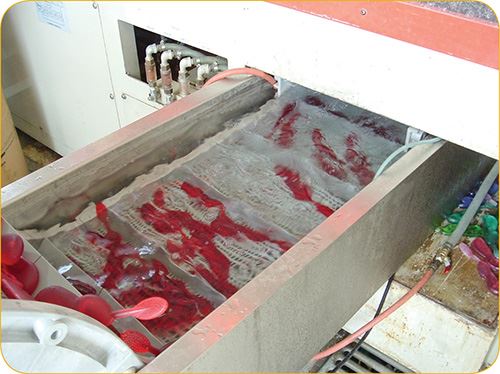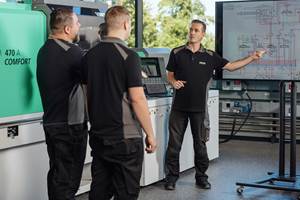Modular Conveyor Boosts Productivity and Profits for Toothbrush Manufacturer
Close Up: Conveyors
Automation in plastics processing can involve sophisticated, high-tech manufacturing cells specialized for a particular application (see NPE feature this month ). Or it can involve much simpler, off-the-shelf solutions that offer the user flexibility to configure—and reconfigure—an automation system according to the job and plant layout.
Automation in plastics processing can involve sophisticated, high-tech manufacturing cells specialized for a particular application (see NPE feature this month ). Or it can involve much simpler, off-the-shelf solutions that offer the user flexibility to configure—and reconfigure—an automation system according to the job and plant layout. Modular conveyors are an example of the latter.
A case in point is Radius, a manufacturer of premium toothbrushes in Kutztown, Pa. (radiustoothbrush.com). The firm injection molds the toothbrush handles from cellulose acetate propionate at around 400 F melt temperature. The handles drop into a cooling tank of water at around 50 F before they are dried and sent on to the station where bristles are added. The problem was that the chilled water cools the outside of the handles while the interior remains hot. With a two-cavity mold, there was a risk of handles falling on top of one another while the inner core was still soft, leaving dimples that rendered the products unusable. To combat this, Radius used an air bubbler that pushed the handles around after they fell into the tank.
That solution, however, was less than perfect. “We had about a 23% reject rate, and this is a multimillion-dollar product for us,” said Radius co-founder Kevin Foley. “Then, of course, you have to regrind that plastic and remake the product to keep up with orders.”
KEEP THEM MOVING
Radius decided to address the problem with a new tank outfitted with a modular belt conveyor from Dynamic Conveyor Corp. (DynaCon), Muskegon, Mich. (dynamicconveyor.com). Foley immediately recognized the flexibility provided by DynaCon’s modular, reconfigurable design. “We broke our unit completely apart when we got it,” said Foley, so his team could try out several different configurations, experimenting with conveyor length and speed. “When we had to expand the lineal distance, we were able to add length to the conveyor and put it back together very easily.”
With the toothbrush handles falling onto a moving conveyor in the cooling tank, the scrap rate dropped to 10%. Then Radius had a brainstorm that enabled it to cut rejects much further. Vertical fins were placed on the belt, creating compartments that maintained separation between the handles as they fell into the cooling bath. Radius also discovered that it could use the bubbler to push air through the grid surface of the plastic conveyor belt. “By the time the handles settle down, they’re sitting on the belt, not on another toothbrush,” explained Foley. This dropped our reject rate to about 1.5%.”
Radius discovered additional benefits on the discharge side of the water bath. Previously, a bristling machine operator sometimes had to stop production and use an air gun to dry out the bristle holes. Now, two box fans above the conveyor dry the parts completely before they drop into bins for bristling. Foley said this addition allowed Radius to increase the belt speed. DynaCon also developed a timing mechanism for filling bins automatically, which Foley anticipates will allow Radius to mold handles overnight on a “lights out” basis.
“The complaint I always heard from assembly is that we never have enough parts. Now we have plenty of inventory,” said Foley, who calculated the annual dollar savings with the new conveyor at $27,000. “Beyond that, we have the ability to make product 16 hours a day instead of eight.”
Related Content
AI: The Next Big Thing in Plastics Processing
Discover how artifical intelligence is revolutionizing plastics processing. Hear from industry experts on the future impact of AI on your operations and envision a fully interconnected plant.
Read MoreProcessing Megatrends Drive New Product Developments at NPE2024
It’s all about sustainability and the circular economy, and it will be on display in Orlando across all the major processes. But there will be plenty to see in automation, AI and machine learning as well.
Read MoreFive Ways to Increase Productivity for Injection Molders
Faster setups, automation tools and proper training and support can go a long way.
Read MoreDrones and Injection Molding Ready for Takeoff
Drones and unmanned aerial vehicles (UAV) are approaching an inflection point where their production volumes — and functionality — will increasingly point to injection molding.
Read MoreRead Next
See Recyclers Close the Loop on Trade Show Production Scrap at NPE2024
A collaboration between show organizer PLASTICS, recycler CPR and size reduction experts WEIMA and Conair recovered and recycled all production scrap at NPE2024.
Read MoreLead the Conversation, Change the Conversation
Coverage of single-use plastics can be both misleading and demoralizing. Here are 10 tips for changing the perception of the plastics industry at your company and in your community.
Read MorePeople 4.0 – How to Get Buy-In from Your Staff for Industry 4.0 Systems
Implementing a production monitoring system as the foundation of a ‘smart factory’ is about integrating people with new technology as much as it is about integrating machines and computers. Here are tips from a company that has gone through the process.
Read More
























